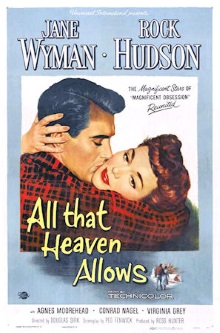
For all that I constantly rag on about the shallowness and mediocrity of most Hollywood films, I continue to be impressed by how thoroughly they’ve mastered the essentials of film-making so long ago. All That Heaven Allows, a film that was considered unremarkable at the time of its release is, I think, a good case in point. Even without considering any of the more subtle messaging that may or may not be present, it’s a solid movie that impresses with its sumptuous visuals, competent acting, excellent cinematography and just enough of a twist to the conventional formula to make a romance story refreshing.
This films stars Jane Wyman and Rock Hudson as the lovestruck couple. The twist is that even though Wyman was only eight years older than Hudson and indeed the main reason that this was filmed seems to have been because the pair had made for a successful couple in an earlier film, Magnificent Obsession, Wyman’s character, the widowed Cary Scott, is portrayed as being much older than Hudson’s character, Ron Kirby. It is the scandalous nature of their relationship, and the disapproval of the town’s residents and Cary’s family members, that drive the conflict in this movie.
This inversion of the usual dynamic allows for some delightful deviations from the usual tropes. Where the camera in most films uses the male gaze by default to accentuate the beauty and sexual attractiveness of the female lead, the camera here tends to stay at a respectable distance from Cary. She is portrayed as being serious, even severe, and dresses modestly as befits her status as a widow of significant means. The one occasion when she departs from this by dressing in a slinky, skin-baring outfit is so notable that it shocks her son, which elicits a joke from her daughter about the Oedipal instincts of men.
As for Ron, the camera seems intent on objectifying him as a sex symbol whenever he’s on screen. The light that falls on him is always arranged such that his face appears to positively glow with virility. Despite being scandalized by his low status as a gardener, the gentle ladies are all aflutter when he’s around. Cary’s son even dismisses his mother’s interest in Ron as being due only to his biceps. The novelty of this inversion keeps everything fresh and entertaining.
How this plays out in the context of the milieu they inhabit is also fascinating to watch. The horrified reactions of the socialites are predictable but still so funny. The characters of Cary’s two children are well chosen for maximum drama: the son is an up-and-coming yuppie destined to be a globe-trotting corporate executive, the daughter is a glasses-wearing university-educated feminist who speaks in academese. By contrast, Ron’s circle of anti-conformist friends who follow his philosophy of self-sufficient living and sneering at society’s expectations could almost pass as a commune of Ayn Rand objectivists with Ron himself as Howard Roark / John Galt.
All this is portrayed with superb visuals. The opening scene is a gorgeous bird’s eye view of the town. Then your eye is drawn to the startlingly vivid colors of the clothes. It is very much a fantasy version of an idealized American small town. Then there’s the picturesque mill where Ron lives, complete with expansive windows that open onto a snow-capped landscape. My wife was convinced that the colors must have been added later but as far as I can tell from my reading, the glorious Technicolor really is part of the original vision of director Douglas Sirk.
Numerous commentators have ascribed all manner of subtle messages to this film, including its indictment of the conformity of the 1950s and the emergence of feminism as a political movement. A Broken Forum poster loves how it apparently incorporates homosexual subtexts, most obviously in the wonderfully loaded line in which Cary accuses Ron of wanting her to be man. To me, all this is pleasing as evidence of how thematically rich the film is even though it is “just” a Hollywood romance, but they aren’t really necessary to enjoy it. It is simply put a well-written story, with beautiful direction, excellent performers and often funny dialogue, a fine example of good cinematic craftsmanship.
One thought on “All That Heaven Allows (1955)”